
NEWS
REPORTS
|
|
ORFEO International
News
February 2013
† Wolfgang Sawallisch
Just half a year before his 90th birthday, Wolfgang Sawallisch has died in Grassau im Chiemgau. Whoever experienced his art at first hand will remember above all the naturalness of his music-making – whether on the conductor’s podium or at the piano. 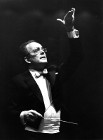
Wolfgang Sawallisch
Foto: Sabine ToepfferHe was still young when he became famous for his fluid tempi that never seemed rushed, however fast they were. His style was devoid of pathos, which was also a reason why he was invited to conduct at the Bayreuth Festival in 1957, ten years after the start of his career. The aim at the time was to free Wagner’s works from the false bombast of times gone by. Nevertheless, Wolfgang Sawallisch never belonged to the “analytical” school of conductors or to the coolly calculating interpreters of classical music. For he always remained full of the enthusiasm that he had displayed at the piano in his youth – an enthusiasm that served to carried him swiftly onwards from his first job as répétiteur and kapellmeister in Augsburg, up to the heights of an international career. In Sawallisch’s first volume of reminiscences, for example, we can read how he learnt much of the operatic repertoire – especially the works of Richard Strauss – by studying and playing through the vocal scores at the piano (all the while imagining their instrumentation, using similar scores as his guide). It was no surprise that singers and musicians held him in high regard as an accompanist and as a partner in chamber music, nor that he inspired great respect among the many singing coaches who later worked under him when he was a chief conductor and general music director. His longest tenure was at the Bavarian State Opera in Munich, where he spent two decades from 1971 onwards. As is well known, the Wagner and Strauss anniversaries of 1983 and 1989 respectively saw him conduct all their stage works in Munich. Sawallisch also recalls in his memoirs that his appointment in Munich had come at a time when he had never intended returning to his native city. His positions as chief conductor of the Vienna Symphony Orchestra and the Hamburg Philharmonic State Orchestra, plus guest engagements in Italy and Japan, had by the 1960s already made him into a cosmopolitan of the music world – a status that was confirmed once again by his time as Music Director of the Philadelphia Orchestra (1993–2003). Sawallisch retained his connection to Japan, not least through his guest performances there with the Bavarian State Opera. Sawallisch’s last new production as Intendant in Munich was of Strauss’s Die Frau ohne Schatten in a production by Ennosuke Ichikawa in an indubitably “uncritical”, fairy-tale kabuki style. In retrospect, this proved that when it came to the forms of intercultural exchange so beloved today – far removed from the ideologies of “director’s theatre” – then this conductor’s supposedly conservative aesthetic was perhaps more advanced than many others acknowledged. His sovereign command of his musical art was never in doubt, from Mozart to the (late) Romantics, and also extended to contemporary composers such as Herbert Blendinger, Keith Fitch, Wilhelm Killmayer and Isang Yun. Sawallisch’s acoustic legacy as both conductor and pianist is well represented on the Orfeo label, be it as the conductor of the Bavarian State Orchestra and the Vienna Symphony Orchestra or at the Salzburg Festival or the other major stations of his career. In the face of such a wealth of music, we can now only look back with a mixture of gratitude and sadness.
| Wolfgang Sawallisch |
|
| * 26. August 1923 – † 22. Februar 2013 |
| Opera |
|
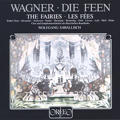
C 062833 |
Wagner, Richard |
Die Feen |
Moll, Gray, Rootering, Studer, Chor des Bayerischen Rundfunks; Symphonieorchester des Bayerischen Rundfunk, Sawallisch |

C 169882 |
Strauss, Richard |
Arabella |
Berry, Schmidt, Varady, Donath, Fischer-Dieskau, Dallapozza, Chor der Bayerischen Staatsoper; Bayerisches Staatsorchester, Sawallisch |

C 345953 |
Wagner, Richard |
Das Liebesverbot |
Prey, Fassler, Schunk, Lenz, Engen, Hass, Chor der Bayerischer Staatsoper; Bayerisches Staatsorchester, Sawallisch |
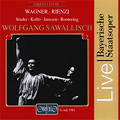
C 346953 |
Wagner, Richard |
Rienzi |
Kollo, Studer, Rootering, Janssen, Chor der Bayerischen Staatsoper; Bayerisches Staatsorchester, Sawallisch |

C 463971 |
Puccini, Giacomo |
Der Mantel |
Fischer-Dieskau, Ilosfalvy, Lenz, Engen, Varady, Töpper, Brokmeier, Chor der Bayerischen Staatsoper; Bayerisches Staatsorchester, Sawallisch |

C 514992 |
Rossini, Gioacchino |
Mosé |
Raimondi, Villa, Brinkmann, Araiza, Lenz, Rootering, Soffel, Moll, Chor der Bayerischen Staatsoper; Bayerisches Staatsorchester, Sawallisch |
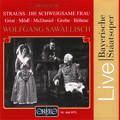
C 516992 |
Strauss, Richard |
Die schweigsame Frau |
Grist, Mödl, McDaniel, Grobe, Böhme, Chor der Bayerischen Staatsoper; Bayerisches Staatsorchester, Sawallisch |
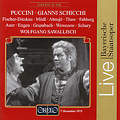
C 546001 |
Puccini, Giacomo |
Gianni Schicchi |
Fischer-Dieskau, Schary, Mödl, Ahnsjö, Thaw, Fahberg, Auer, Engen, Chor der Bayerischen Staatsoper; Bayerisches Staatsorchester, Sawallisch |

C 625042 |
Strauss, Richard |
Ariadne auf Naxos |
Matic, Berry, Schmidt, King, Weber, Hiestermann, Riener, Sramek, Gruberova, Tomowa-Sintow, Düsing, Equiluz, Vogel, Dickie, Vance, Miljakovic, Yachmi, Wiener Philharmoniker, Sawallisch |

C 843112 |
Verdi, Giuseppe |
Macbeth |
Fischer-Dieskau, Bumbry, Lagger, Lorenzi, Konzertvereinigung Wiener Staatsopernchor, Wiener Philharmoniker, Sawallisch |
| Lied |
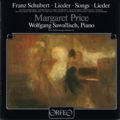
C 001811 |
Schubert, Franz |
Ausgewählte Lieder |
Price, Schöneberger, Sawallisch |
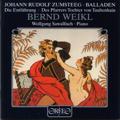
C 074021 |
Zumsteeg, Johann Rudolf |
Balladen: Die Entführung, Des Pfarrers Tochter von Taubenhain |
Bernd Weikl, Wolfgang Sawallisch |

C 185891 |
Mendelssohn, Schumann, Pfitzner, Wolf etc. |
Eichendorff-Lieder |
Dietrich Fischer-Dieskau, Wolfgang Sawallisch |

C 333931 |
Mahler, Gustav |
Lieder aus "Des Knaben Wunderhorn" |
Dietrich Fischer-Dieskau, Wolfgang Sawallisch |
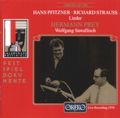
C 524991 |
Pfitzner, Hans; Strauss, Richard |
Liederabend |
Hermann Prey, Wolfgang Sawallisch |
| Concert |

C 006061 |
Blendinger, Herbert |
Media in vita op. 35 |
Donath, Becht, Bayerisches Staatsorchester, Wolfgang Sawallisch |

C 039101 |
Brahms, Johannes |
Ein deutsches Requiem |
Price, Allen, Chor des Bayerischen Rundfunks; Symphonieorchester des Bayerischen Rundfunks, Sawallisch |

C 145851 |
Bruckner, Anton |
Symphonie No. 1 c-Moll (Linzer Fassung 1865/66) |
Bayerisches Staatsorchester, Sawallisch |

C 241911 |
Bruckner, Anton |
Symphonie No. 5 B-Dur |
Bayerisches Staatsorchester, Sawallisch |

C 024821 |
Bruckner, Anton |
Symphonie No. 6 A-Dur |
Bayerisches Staatsorchester, Sawallisch |

C 160851 |
Bruckner, Anton |
Symphonie No. 9 d-Moll |
Bayerisches Staatsorchester, Sawallisch |

C 406961 |
Furtwängler, Wilhelm |
Symphonie No. 3 |
Bayerisches Staatsorchester, Sawallisch |

C 112851 |
Hindemith, Paul |
Requiem "For those we love" |
Fassbaender, Fischer-Dieskau, Wiener Staatsopernchor; Wiener Symphoniker, Sawallisch |

C 795091 |
Mozart, Wolfgang Amadeus |
Symphonie g-Moll KV 183, Klavierkonzert Es-Dur KV 449, Symphonie g-Moll KV 550 |
Friedrich Gulda, Concertgebouw Orkest, Wolfgang Sawallisch |

C 168881 |
Pfitzner, Hans |
Vor- und Zwischenspiel zu Palestrina, Das Käthchen von Heilbronn, Die Rose vom Liebesgarten |
Symphonieorchester des Bayerischen Rundfunks, Sawallisch |
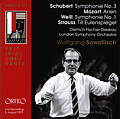
C 606031 |
Schubert, Franz; Weill, Kurt; Strauss, Richard; Mozart, Wolfgang Amadeus |
Symphonie D 200, Symphonie No. 1, Till Eulenspiegels lustige Streiche, Opern- und Konzertarien |
Dietrich Fischer-Dieskau; London Symphony Orchestra, Sawallisch |

C 004821 |
Strauss, Richard |
Symphonie für Bläser "Fröhliche Werkstatt" |
Münchner Bläserakademie, Sawallisch |

C 236901 |
Strauß, Johann (Sohn); Strauß, Johann (Vater); Strauß, Josef |
Festkonzert |
Wiener Symphoniker, Sawallisch |
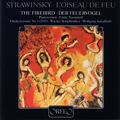
C 044831 |
Strawinsky, Igor |
Der Feuervogel, Suite Orchester- und Klavierfassung |
Naoumoff; Wiener Symphoniker, Sawallisch |
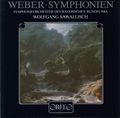
C 091841 |
Weber, Carl Maria v. |
Symphonien No. 1 & No. 2 |
Symphonieorchester des Bayerischen Rundfunks, Sawallisch |

C 161871 |
Wagner; Verdi; Mozart; Beethoven; Brahms |
Berühmte Ouvertüren |
Bayerisches Staatsorchester, Sawallisch |
top |
|

ORFEO
Chormusik & Oratorien
Edition zeitgenössisches Lied
Kammermusik
Lied
Musica Rediviva
Oper
Recital
Symphonie & Konzert
Weihnachten
ORFEO D'OR
Bayerische Staatsoper live
Bayreuther Festspiele live
Deutsche Oper am Rhein
Salzburger Festspieldokumente
Wiener Staatsoper live
Wiener Symphoniker
Dirigenten
Große Sänger d. 20. Jh.
Orchesterkonzerte
Quartette
Solisten
|